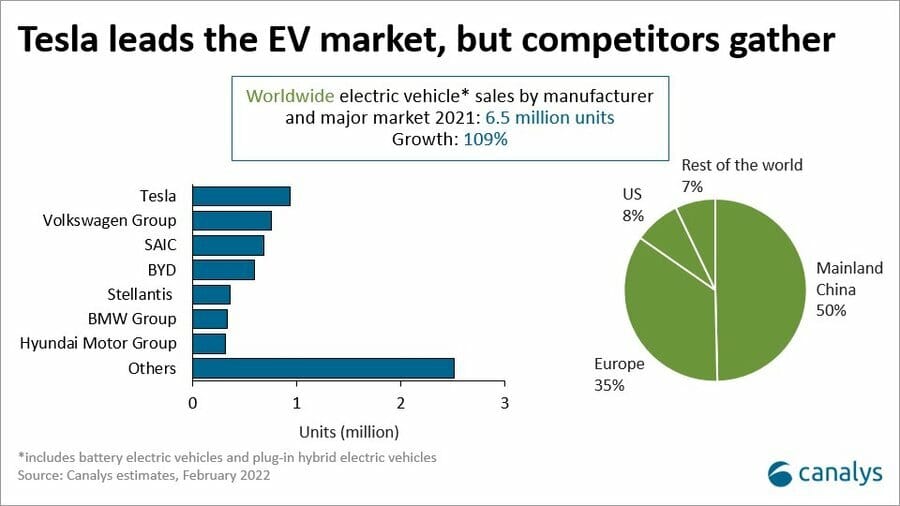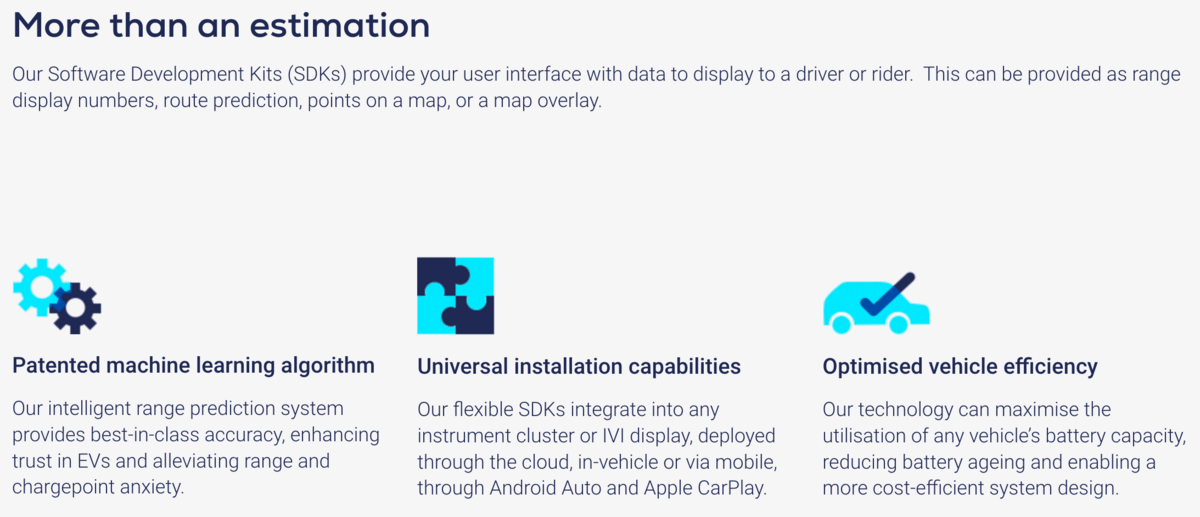In today’s edition:
🚘 Predicting EV journeys
🇸🇦 Saudi Arabia’s diversification push
🌳 Falling deforestation in Brazil
📩 Submit deals, announcements, events & opportunities, or general curiosities for the newsletter here.
Forwarded on this email by a friend?
💼 Big Business (1-minute read)
Saudi Arabia pushes for homegrown EV industry
In a fresh drive to diversify its economy from oil income — its primary revenue source as the world’s largest exporter — Saudi Arabia will pour billions into a project to create an electric vehicle (EV) manufacturing hub. Yet, rather than build an industry from scratch, the Saudis plan to invest in existing EV companies to support the transfer of skills, knowledge and technology — like purchasing a majority stake in US-based Lucid Motors which will produce 125,000 EVs in the country by 2030.
The importance: EV manufacturing is an important pillar in the kingdom's diversification drive which aims to expand the local labour force into more sustainable industries, teach workers new skills and create jobs.

Intelligent Octopus tariff offers electric vehicle drivers cheaper rates to charge their cars overnight
Challenge: Power systems must be actively managed to maintain a steady balance between supply and demand. This is a complex task as demand varies continually, made more challenging with renewable sources of electricity that fluctuate with the weather.
The Virtual Power Plant: Octopus Energy claims it now manages more than 100MW of electric car charging power through its 'Intelligent Octopus' smart home energy tariff, which it says amounts to a flexible power supply greater than that provided by the largest battery currently operating on the UK grid through its ‘Virtual Power Plant.’
How it works: Customers use the Octopus Energy app to set the time (and amount) they want their vehicle charged. The company’s energy technology platform - Kraken - then works in the background to automatically charge the cars up when there is abundant, low-cost energy and when the grid is less busy, helping to balance out demand and supply and support more renewables on the grid.
Breakthrough in wind turbine recycling
We’ve spoken before about the challenge of recycling wind turbine blades, with blades typically sent to landfill. WindEurope expects 25,000 tonnes of blades to be heading to landfill by 2025 — creating a waste mountain. Danish wind turbine maker, Vestas, presented a new solution for epoxy-resin-based turbine blondes (which are especially challenging to recycle) using chemical processes. The company claim its innovation can break the material down into “virgin-grade” materials, which can be recycled into other goods, and now plans to work with industry, academia and policymakers to scale the solution.
💰 Deals of the Week (1-minute read)
🛵 VFlowTech, a vanadium-based redox flow (VRF) battery company in Singapore, has announced a US$10 million Series A funding round led by Japanese VC firm Real Tech Holdings.
🍎 Ionblox, a next-generation lithium-ion battery company, announced a second close of its Series B round at an increased $32 million.
🚗 Zypp Electric, an Indian startup that offers an EV-as-a-service platform catering to e-commerce companies and gig workers, has received a $25 million investment led by Taiwan’s battery-swapping giant Gogoro.
☀️ CFEX, Inc., provider of a cloud-based decarbonization platform to help enterprises track, plan, and reduce Scope 2 GHG emissions, closed its seed funding led by Accurant International.
💡 Start-up Spotlight (1-minute read)
Spark EV Technology
One-liner: More accurate journey predictions to remove anxieties around EV range and charging time which enhanced vehicle trust and faster EV adoption.
Problem: Range anxiety, the fear that an electric vehicle will not have enough battery charge to reach its destination, is cited as the top barrier to EV adoption by 26% of consumers. Existing in-vehicle range predictions can be in error by more than 100% (e.g. driving 30km can see the range remaining drop by 60km), which impacts a driver's trust in their EV.
Deep Dive: Spark EV Technology provides personalised journey prediction and map display software for electric vehicles of all sizes. Combining data (such as vehicle size, driver experience, and weather predictions) with Machine Learning algorithms significantly improves journey prediction accuracy compared to existing vehicle systems. Their goal is to accelerate EV adoption by providing their automotive customers with a trusted onboard system to remove range and time anxiety for drivers. The technology also provides value for companies' management of their e-mobility fleet solutions through sophisticated route and chargepoint planning.
Revenue model:
Licence fee or Royalty model: Charge per asset the technology is used within - customers are generally automotive OEMs, Tier 1 suppliers, and technology integrators.
Consultancy services: Support companies with reporting, detection and benchmarking whilst our Spark Insights tools uncover commercial opportunities and devise applications to convert ICE drivers to eMobility
Founder/s: Fotis Fotiadis (Cambridge Uni), Miha Pipan (Cambridge Uni)
Country: UK
Total funding raised: Seed ($250k)
Partnerships: BP, Uni of Cambridge, Hyundai, Hond

💭 Little Bytes
Quote: “The European Union will strengthen its strategic sovereignty and make its economic, industrial and technological base fit for the green and digital transitions.” European Council President Charles Michel.
Stat: Less than 1% of businesses have credible climate transition plans — CDP
Watch: Chile is creating a new national park in the driest desert on earth.
🗞 In other news…
Climate-focused investors in BP voiced concern this week about the company's announcement that it has scaled back climate targets and now plans to produce more oil and gas for longer, yet the company's share price continued to surge.
Deforestation in Brazil's Amazon rainforest fell in January from a year earlier, satellite data showed on Friday, in the first monthly figures under President Luiz Inacio Lula da Silva.
The Australian Government has refused plans for a new coal mine on climate grounds and due to its proximity to the Great Barrier Reef.
The UK is home to one of Europe's least energy-efficient housing and building stocks. The UK Green Building Council (UKGBC) has announced a new ‘Task Group’ to accelerate action on retrofitting commercial buildings.
